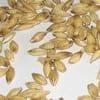Explore all the information on
Mycotoxins in swine
Pigs are extremely sensitive to mycotoxins. Both the type and concentration of mycotoxin(s) in the feed, as well as the age and phase of production of the pig, will determine the degree to which the animal is affected. Young pigs and breeding sows/boars are generally the most adversely affected by mycotoxins, but it is important to note that grow-finish pigs can also be adversely affected by these harmful substances.
Even at low levels in feed, mycotoxin contamination reduces pig performance, affects health status and can contribute to increased mortality rates. In addition, irreversible tissue damage can occur, which can compromise performance long after mycotoxins have been removed from the feed.
Mycotoxins are harmful, naturally occurring substances produced by molds and fungi. These fungi commonly grow on feedstuffs and tend to multiply during adverse weather conditions. More than 500 mycotoxins have been identified to date, and this number is steadily increasing. Mycotoxins are invisible, stable and toxic chemical compounds. They are common in the farm environment, surviving in multiple places and on many different types of feed sources.
Zearalenone (ZEA) is a naturally occurring mycotoxin produced by Fusarium species, mainly Fusarium graminearum, on a variety of different grains, such as corn, wheat, rice, sorghum, barley and rye. (4) The Fusarium graminearum also survives in crop residues, which in turn provide the inoculum for the next year's crop. (3) The primary effect of ZEA is estrogenic, and prepubertal female pigs are clearly the most affected farm animals. The basis for the estrogenic effect is well...
Comments : 0
Recommendations: 0
Testing a mycotoxin adsorber (Agrabond) in a 21-day farm trial on gilts produced favourable results. The objective of this study was to determine if the addition of the mycotoxin adsorbent Agrabond (a brand of Agranco) negated, lessened or postponed the...
Comments : 0
Recommendations: 0
The Indiana Statistics Service has discovered mycotoxin levels in this year’s Indiana corn crop - apparently the worst in 10 years.
316 samples from 70 counties were examined to determine the severity of major ear rot diseases. The toxicology group at the Indiana Animal Disease Diagnostic Laboratory performed the analysis.
Samples from six counties were found to contain deoxynivalenol (DON), or vomitoxin. Levels ranged from 0.5 - 8 ppm.
These levels are of great concern to pig...
Comments : 0
Recommendations: 0
Poster presented at the BIOMIN World Nutrition Forum 2006 Introduction Fusarium fungi are capable of producing mycotoxins to a variable degree. The major Fusarium toxins are fumonisins, A- and...
Comments : 0
Recommendations: 0
ABSTRACT Investigation was carried out with twenty-four (24) crossbred (Large White x Landrace) male weanling pigs of 8-9 weeks of age averaging 6.94±0.26 kg to study the haematotoxicity of dietary fumonisin B 1 (FB 1 ) in pigs. The 24 animals were randomly assigned to four treatment diets containing approximately 0.10, 5.10, 10.10 and 15.10 ppm fumonisin B 1 constituting diets 1,2,3 and 4 respectively, in a 6-month feeding trial. Blood...
Comments : 0
Recommendations: 0
Scientists at the University of Manitoba are preparing to launch an expanded full scale assessment of the value of pearling as a means of removing mycotoxin from fusarium contaminated barley.
Fusarium head blight, a fungal infection which primarily affects cereal crops, produces a mycotoxin, deoxynivalenon, which, when included in swine rations, tends to cause feed refusal resulting in slower growth.
Commercial scale pilot studies conducted by the University of Manitoba have shown...
Comments : 0
Recommendations: 0


Full-fat Rice Bran as an Alternative Feed Ingredient for Corn in Grow-finish Pigs
Suggested link
What information is around on mycotoxins and how does it affect pigs? I would be interested to hear from others if they have come across this problem with grain and the problems they have encountered and how to get around contaminated grain. ...
Comments : 0
Recommendations: 0
Swine
Swine are sensitive to mycotoxins, especially nursing or nursery-age swine. In general, mycotoxins cause reductions in feed intake, growth performance, and immune function when levels are relatively low. Producers must be aware that if one toxin is identified in a sample, the chances are high that other toxins are present. Some toxins may not have been identified as of yet, but research on known mycotoxins provides...
Comments : 1
Recommendations: 0


.jpg&w=3840&q=75)







